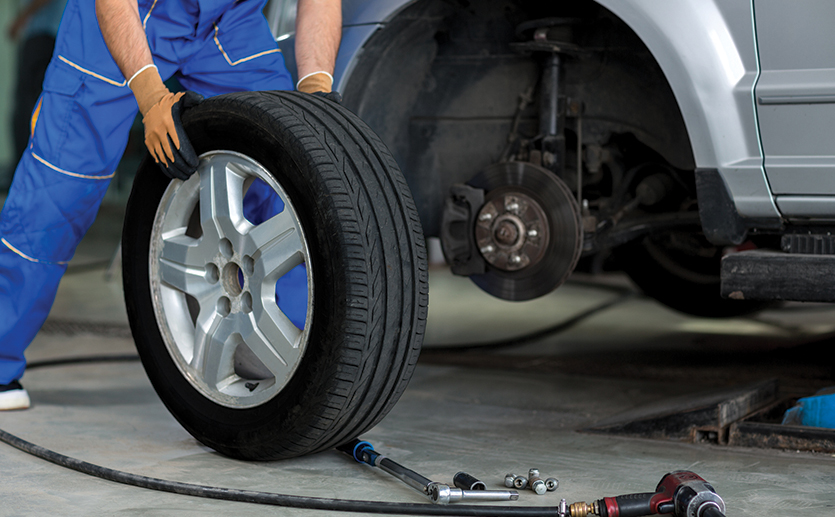The Link Between Tire Solution and Fuel Performance
Performance in fuel consumption is a vital issue for automobile proprietors looking for to maximize their driving experience. Amongst the various variables that affect gas efficiency, tire solution sticks out as a vital component that commonly goes neglected. The elaborate partnership between tire upkeep and fuel economy is a testimony to the intricate workings of an automobile. By comprehending exactly how tire care straight impacts the performance of your car, you can unlock a realm of possibilities that not only boost efficiency but additionally add to set you back financial savings in the future.
Significance of Proper Tire Rising Cost Of Living
Correct tire inflation is a critical element in making best use of gas effectiveness and making sure optimal automobile performance. When tires are underinflated, it produces a lot more moving resistance, causing the engine to function more difficult and burn more gas to maintain the same speed. On the other hand, overinflated tires can result in a harsher experience, uneven tire wear, and reduced traction. To find the advised tire pressure for your car, describe the owner's guidebook or the sticker label situated on the driver's side door jamb.
Maintaining the correct tire stress not just boosts fuel efficiency yet additionally boosts driving security. Consistently inspecting and adjusting tire stress, especially in the past lengthy trips, is an easy yet efficient method to enhance your car's gas economy and guarantee a smooth driving experience.
Effect of Tire Tread Deepness
Keeping the advised tire stress is vital for ideal vehicle performance and fuel effectiveness; likewise, the step depth of your tires plays a crucial function in ensuring safety and traction on the road. Tire walk deepness straight influences the capacity of your tires to hold the roadway surface area, especially in wet or unsafe problems. As tires wear down, their tread depth reductions, impacting their capacity to channel water away and maintain proper contact with the roadway. The advised minimum step depth is generally 2/32 of an inch, yet for boosted security and performance, numerous specialists recommend changing tires prior to they reach this point. Appropriate tread depth not just guarantees far better handling and braking but additionally adds to fuel efficiency by minimizing rolling resistance. Frequently checking your tire walk depth and replacing tires when necessary is a straightforward yet reliable way to promote both safety and security and gas performance when traveling.
Role of Wheel Placement in Efficiency
Guaranteeing exact wheel alignment is crucial for optimizing vehicle performance and taking full advantage of gas economic situation. Correct wheel placement involves adjusting the angles of the wheels to manufacturer requirements, making certain that they are alongside each various other and vertical to the ground. When wheels are misaligned, it can lead to unequal tire wear, raised rolling resistance, and lowered gas effectiveness.

Furthermore, precise wheel positioning can likewise enhance dealing with and stability, lowering the amount of power needed to maneuver the lorry (morris tire). By lessening unneeded friction and drag, proper wheel positioning plays an essential function in boosting total vehicle efficiency and gas economy. Normal wheel placement checks and adjustments are necessary for maintaining optimum efficiency and taking full advantage of gas savings
Connection In Between Tire Upkeep and MPG
A necessary facet of maximizing fuel performance in lorries is the maintenance of tires and their direct effect on miles per gallon (MPG) Proper tire upkeep plays a critical duty in taking full advantage of gas economic climate. One crucial factor impacting MPG is tire stress. Underinflated tires raise rolling resistance, causing the engine to function more challenging and shed even more fuel. On the various other hand, overinflated tires minimize the get in touch with spot with the roadway, bring about uneven wear and lowered gas efficiency. Routinely inspecting and maintaining the proper tire stress can considerably improve MPG.
Furthermore, tire tread depth likewise influences fuel performance. By ensuring tires have appropriate tread deepness, Going Here vehicle drivers can enhance both safety and gas economic situation.
Fundamentally, proper tire upkeep, including monitoring tire pressure and tread deepness, is straight connected to accomplishing ideal MPG. By integrating routine tire assessments and maintenance right read more into a vehicle treatment regimen, drivers can not just prolong tire life however likewise improve fuel efficiency, inevitably saving money and decreasing environmental impact.

Tips for Fuel-Efficient Tire Care
Offered the vital connection between tire maintenance and fuel effectiveness, implementing efficient strategies for optimizing tire treatment is crucial to boosting general car performance. Turning tires at recommended periods advertises also walk wear, enhancing gas efficiency by making sure all tires add equally to lorry performance. By including these fuel-efficient tire care ideas into a routine maintenance schedule, drivers can maximize fuel performance, minimize operating prices, and extend the life of their tires.
Final Thought
Finally, proper tire solution plays an essential function in fuel performance. Keeping right tire inflation, monitoring tread depth, and guaranteeing wheel Learn More alignment can all contribute to maximizing miles per gallon. By routinely keeping tires and following fuel-efficient tire care tips, vehicle drivers can optimize their car's efficiency and lower gas consumption. It is vital to focus on tire maintenance to not just conserve cash on fuel costs but also to advertise overall automobile performance.